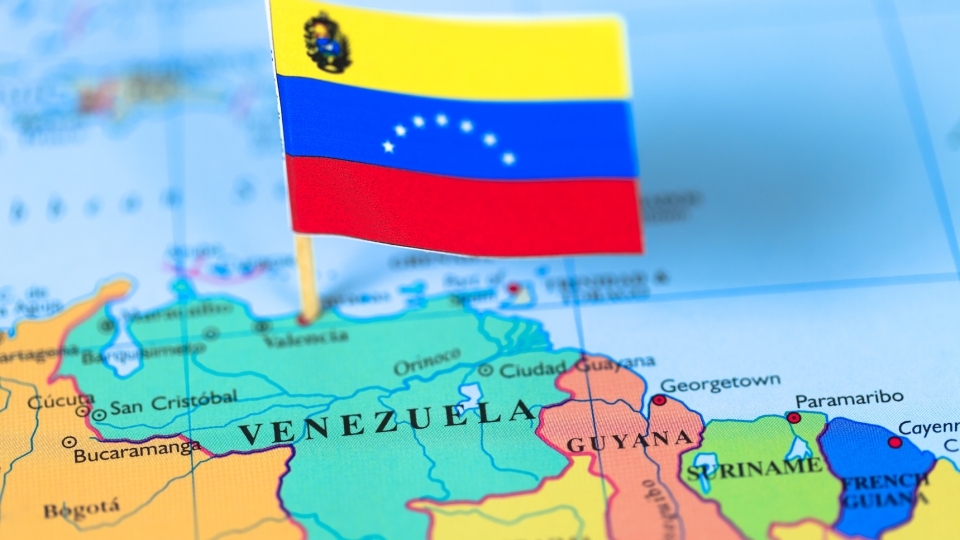What's the Endgame in Venezuela? Political Science Professor Explains U.S. Pressure Campaign
November 13, 2025
- Author
- Jay Pfeifer

The U.S is ratcheting up pressure on the regime of Venezuela President Nicolás Maduro. The U.S. has blown up nearly 20 boats, killing dozens on board, claiming the vessels were ferrying drugs. The world’s largest aircraft carrier, the USS Gerald R. Ford, now is part of the largest U.S. military presence in Central and South America since the 1990 invasion of Panama.
Britta Crandall, a professor of political science and director of the Center for Interdisciplinary Studies, is an expert on South America. Here, she explains how we’ve gotten to this point.
Why has the American posture toward Venezuela changed so much in the last couple of months?
There are a couple of reasons. One is what has always driven the relationship between the United States and the region as a whole: drugs and migration.
What is different now is the Trump administration has conflated regime change, terrorism and drugs all into one package. These priorities are nearly indistinguishable from one another. The fact that Maduro is framed as a narco-trafficker and a terrorist is driving some of the aggression.
Is there a reason for that shift?
It’s interesting because critics of President Trump might emphasize that he and Maduro have a number of similarities. They're both populists; they both challenge democratic norms; they have both cultivated a strongman image and a nationalist style of governance.
In this case, it’s important to identify not just the whims of President Trump, but the individuals influencing policy. In this regard, much of the antipathy toward Maduro is driven by Secretary of State Marco Rubio, who has long held public disdain for Maduro. The Cuban diaspora in Florida — that Rubio represented as Senator — sees a lot of parallels between Castro and Maduro. María Corina Machado, who just won the Nobel Peace Prize as the leader of the pro-democracy opposition to Maduro, is another crucial influence. Members of her team have held private meetings with Trump administration officials and she has publicly supported U.S. pressure on Maduro. When Machado won the Nobel Prize in October, she even dedicated it to President Trump. Machado and the Venezuelan opposition have helped reinforce the connection between Maduro and Tren de Aragua, the Venezuelan gang that props up Maduro.
It is hard to imagine a Venezuela that's less stable than it is now.
Is the U.S. pursuing regime change? Is the U.S. going to force him out like they forced out Manuel Noriega in 1990?
Rhetorically, the Trump administration has stated that its goal is to get rid of the drug syndicates. I don’t think the U.S. wants to talk about “regime change.” They don't necessarily need to say, “We're taking Maduro out because he's an unsavory leader.” They can focus on stopping drugs and hope that cracks emerge in the military to enable a change in power.
So if the added pressure — through strikes, displays of power or more covert channels — displaces Maduro, what are the implications of a destabilized Venezuela?
It is hard to imagine a Venezuela that's less stable than it is now.
Venezuela was one of the few countries in South America that didn’t have a repressive military dictatorship during the 1960s and 1970s. Thanks to its oil industry and relatively stable democracy, Venezuela has historically been seen as a helpful neighbor; it took in refugees, migrants and displaced people fleeing Chile, Argentina and Uruguay during their military regimes. (Most famously, author Isabel Allende found safe harbor in Venezuela for 13 years following Chile’s 1973 military coup.)
Now, its neighbors have been repaying that hospitality for more than a decade. Venezuelan refugees and migrants have streamed out of the country — an estimated one-third of Venezuelans have fled. The implications of this mass exodus for remaining Venezuelans — in terms of family structures, food security, and access to basic services and safety — are difficult to exaggerate. That is to say, Venezuela is already destabilized.
So what is the solution?
The unpredictability of the Trump administration makes this a very difficult question to answer. One scenario involves the U.S. government engaging in limited strikes focused on drug networks, calling it a win, then going home. But some degree of a peaceful, negotiated exit by Maduro is certainly the best option. This hinges on the Venezuelan military’s actions. A combination of sticks and carrots, not least of which is the fear of prosecution, has ensured its loyalty to Maduro. The Venezuelan opposition hopes that offers of amnesty, frustration by the military’s lower ranking troops, combined with U.S. pressure, will prompt a split. Whether this results in a more stable, democratic Venezuela is a totally separate question.



